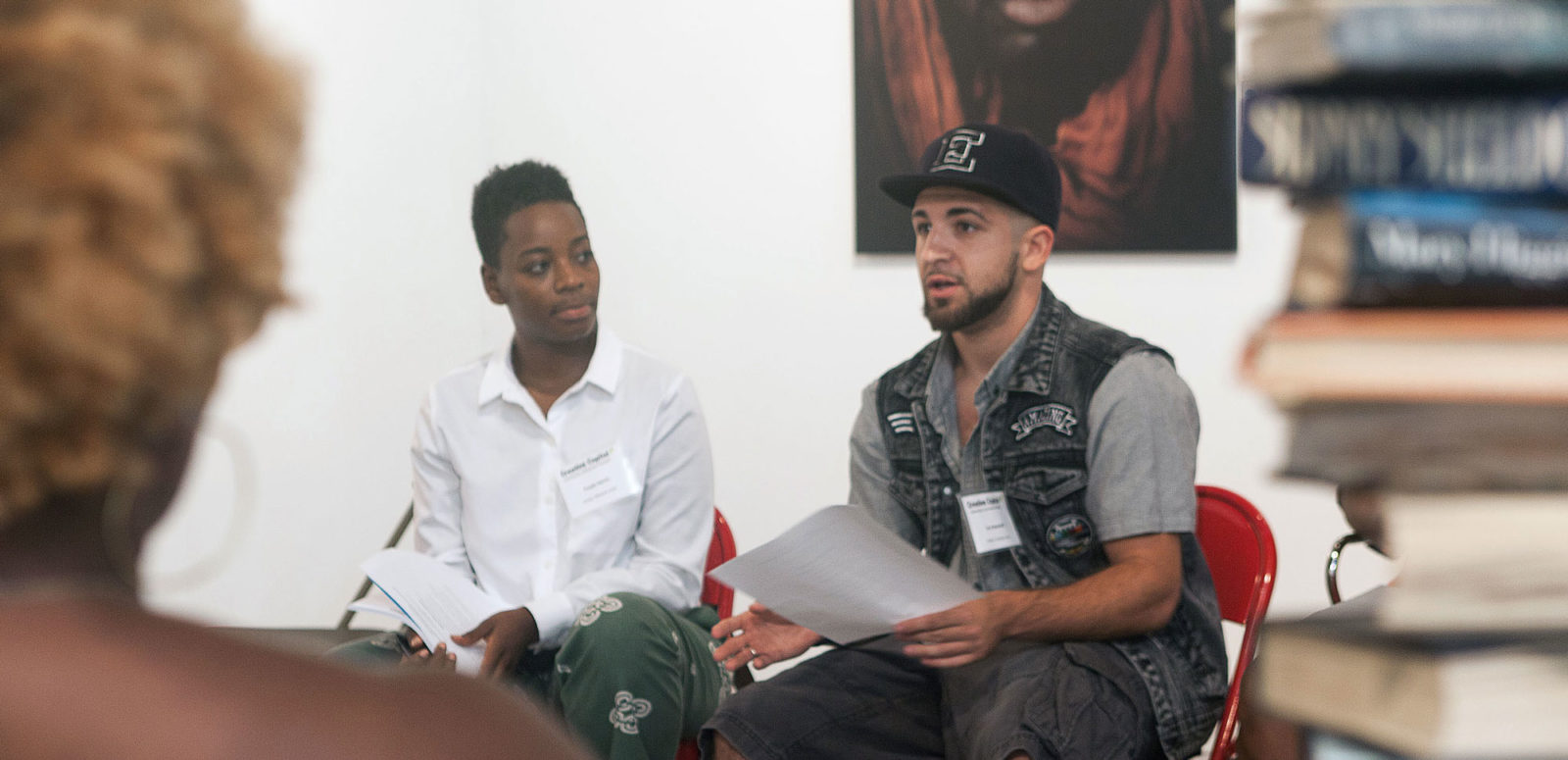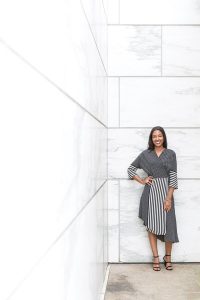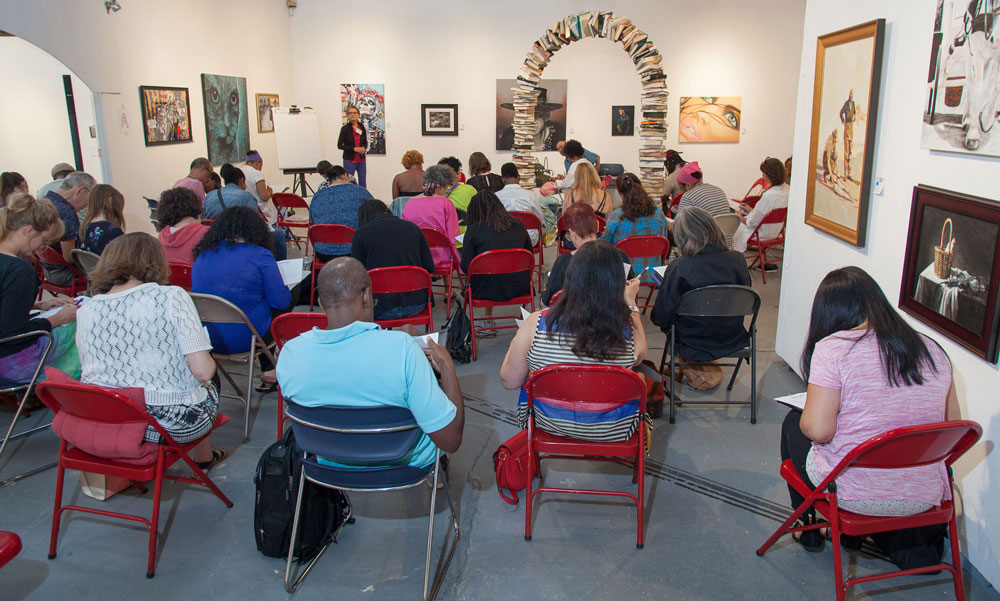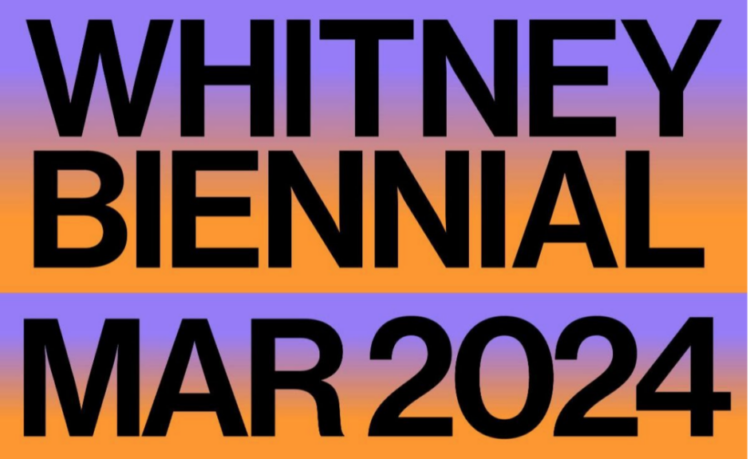Taylor Renee Aldridge: Success Doesn’t Always Come With A Feeling of Self Worth

Taylor Renee Aldridge is a writer, curator and founder of ARTS.BLACK, a journal of art criticism from Black perspectives. In 2016 she received a Kresge Fellowship for her writing. Every year, the Kresge foundations provides their fellows with a weekend-long career advancement retreat through Creative Capital’s professional development workshops.
Despite receiving a wave of awards and recognition, Taylor told us that, for artists and writers, success isn’t always accompanied by a feeling of self worth. We asked her to share more about her experience at the workshop.

Taylor Renee Aldridge. Photo by Jacob Lewkow.
I am a writer and a curator based in Detroit, Michigan. In my work, I aim to hold accountable traditional practices that perpetuate inequity and exclusion, specifically within the arts industry. I use language and counter-narrative to remedy antiquated understandings of various cultures and classes to encourage accessible and equitable content creation in art and exhibition making.
The politics and socio-economics of place has also been integral to how I think about artmaking as a cultural critic and arts administrator. I moved back to my hometown, Detroit, Michigan in 2014 shortly after the city’s bankruptcy. Detroit is my home but it also became subject matter for much of my work. I fell witness to media coverage that spotlighted hyperbolic narratives, narratives that often existed in a vacuum, about the city. I used writing as a tool to make evident the underbelly of the vibrant ecosystem of artists and makers that often went unnoticed in mainstream outlets.
A few months ago, I learned that, in honor of my work as a writer in Detroit, I was awarded with a 2017 Kresge Arts Fellowship, which includes a $25,000 unrestricted grant and professional development support through Creative Capital. It is a wonderful feeling to have the work I enjoy and feel so passionate about praised by my peers and community members.
With my excitement, I have also developed a quiet guilt most likely prompted by my imposter syndrome, where I find myself asking the questions, am I worthy of all this support? Will I be able to deliver and continue creating work that people appreciate?
I’ve received a few other competitive grants over the span of less than a year. With my excitement, I have also developed a quiet guilt most likely prompted by my imposter syndrome, where I find myself asking the questions, am I worthy of all this support? Will I be able to deliver and continue creating work that people appreciate? And specifically, as a person who had a middle-low income, fruitful but modest upbringing, my experiences with money have often looked like a revolving door; having to spend money as soon as I earn it.
As a recent grantee, I carried these thoughts with me as I prepared for my first retreat provided by Creative Capital and the Michigan-based organization Creative Many, a statewide arts advocacy organization. I had come to know a handful of previous Kresge Fellows prior to my award, and one common thread in all of their reflections on the Fellowship was sharing the value of the professional development. Some of the previous Fellows even expressed that the professional development has been more impactful to their careers than the $25,000 award. These reflections prompted a great deal of curiosity for me around what Creative Capital offers.
I thought, what type of secret resources are they sharing that makes this experience better than a bulk of funds? I later learned that the professional development is carried out in the form of a two and a half day long retreat led by Creative Capital. It is dense, intense, yet immensely inspiring.

Artists at a Creative Capital workshop in Trenton, New Jersey, made possible by the New Jersey Arts Council and the Dodge Foundation. Photo by Bill Horin.
On the first day of the retreat, I met workshop leaders Colleen Keegan, Aaron Landsman, Beverly McIver, Cesar Cornejo and Dread Scott. I was anxious about opening up and talking about my work—especially among these seasoned powerhouses—but the environment immediately felt welcoming and judgment free.
[Beverly McIver’s] seemingly simple advice created a deep sense of relief, and I felt heard in ways that I had not felt before. I realized the feeling of unworthiness could be a big hindrance in the success of an artist.
After introductions, I and the other 2017 Kresge Fellows met with the workshop leaders. The first session began with “Strategic Planning” whereby we discussed the formal tenets of a business plan and how to frame one’s practice as a business. Initially, I thought this workshop would be a tedious loquacious presentation on business plans. Luckily, I was wrong. The workshop leaders presented this intel in a way that was conversational, engaging and anecdotal. The approach was artists centered; they presented scenarios that are relevant to artist lifestyles to help ground our thinking for business plan approaches.
What I appreciated most about these offerings was how applicable the insights were to any creative practice. The workshops not only focused on the artistic lifestyle but also on the lifestyle of a human being who happens to be creative. They encourage artists to ask “how can I make my work, work for me?” I gained insights on financial acumen and business development that I was able to share with members of my family who are not at all working in creative sectors. The adaptability of what we learned was invaluable.
Between sessions, I found myself in a brief conversation with artist Beverly McIver. I shared with her my hesitation in celebrating my recent achievements because I struggle with imposter syndrome. I also shared that receiving large unrestricted sums of money for my creative talents has left me some anxiety—simply because I’m not used to having money.
In so many words, she assured me that I am worthy and that I deserve even more. She waxed on about the relationship between artists and money, and the anxieties that come along with receiving large sums of money for work you enjoy doing or plan to do. We exchanged ideas on how to learn how to have money when you’re not used to having it. Knowing that her upbringing was also modest, and also a Black woman artist like myself, her seemingly simple advice created a deep sense of relief, and I felt heard in ways that I had not felt before. I realized the feeling of unworthiness could be a big hindrance in the success of an artist.
In addition to the wealth of financial insight shared during the retreat, I gained mental and emotional literacy that will continue to enable and sustain my practice. The most valuable part of the experience were the session leaders, who provided personal and professional stories about their practice that reminded me that I was not alone in my feelings of imposture. For the weekend, they were business consultants as well as therapists, encouraging us to prioritize our creative making as well as emotional and spiritual sustainability.
Taylor Renee Aldridge is a writer based in Detroit. She won the Andy Warhol Foundation | Creative Capital Arts Writers Grant in 2016. Read more of her work on her website.
